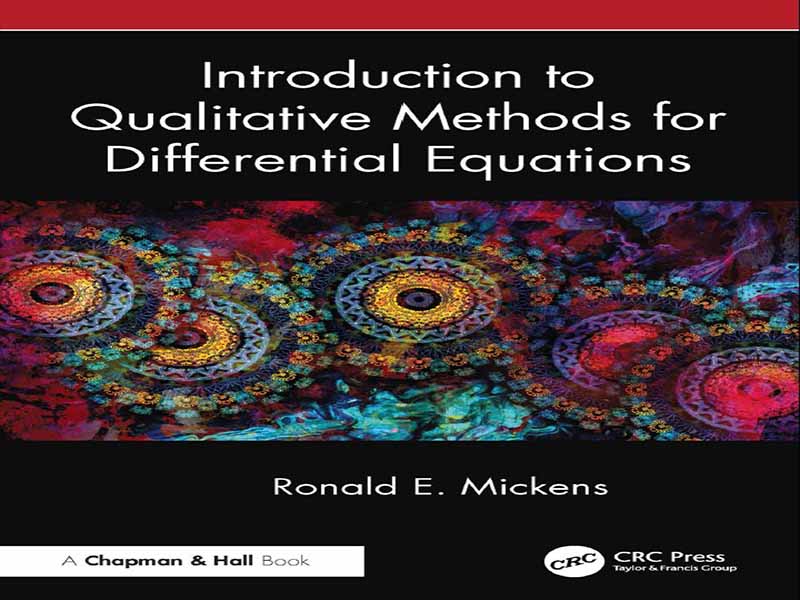- عنوان کتاب: Introduction to Qualitative Methods for Differential Equations
- نویسنده: Ronald E. Mickens
- حوزه: معادلات دیفرانسیل
- سال انتشار: 2025
- تعداد صفحه: 289
- زبان اصلی: انگلیسی
- نوع فایل: pdf
- حجم فایل: 5.02 مگابایت
انسانها کنجکاو هستند، به خصوص در مورد جهان فیزیکی. علم زمانی آغاز شد که (برخی) از انسانها فهمیدند که جهل وجود دارد، اما میتوانستند در چارچوب فرآیندی که اکنون آن را روششناسی علمی مینامیم، کاری در مورد آن انجام دهند. به همراه این روششناسی، یک زبان مرتبط پدید آمد که اکنون آن را «ریاضیات» مینامیم. یکی از پیامدهای ساخت ابزارهای ریاضی، تکامل جداگانه آنها به یک حوزه فکری برای مطالعه ویژگیهای خاص خود، جدا از ریشههای آن در علم بود. با در نظر گرفتن ریاضیات به عنوان زبان علم، مطالعه دقیق جهان فیزیکی با ساخت مدلهای ریاضی برای تجزیه و تحلیل پدیدههای فیزیکی خاص آغاز شد. با این حال، اتفاق جالبی رخ داد؛ اساساً هیچ یک از معادلات ریاضی مرتبط را نمیتوان دقیقاً برای راهحلهایشان حل کرد. در نتیجه، طیف گستردهای از تکنیکهای تقریبی از جمله روشهای محاسباتی برای تعیین راهحلهای عددی ایجاد شد. مجموعه دیگری از تکنیکهای کمتر استفاده شده، مبتنی بر کسب اطلاعات کیفی در مورد راهحلهای مورد نظر است. در حالی که بسیاری از این رویهها از اوایل قرن نوزدهم در دسترس بودهاند، بسیاری از دانشمندان و محققان شاغل از وجود آنها و/یا نحوه اعمال آنها در معادلاتی که امیدوارند تجزیه و تحلیل، درک و حل کنند، آگاه نیستند. هدف اصلی این کتاب کوچک، معرفی برخی از این روشهای کیفی و نشان دادن چگونگی اعمال آنها بر معادلات دیفرانسیل است. دلیل تمرکز بر معادلات دیفرانسیل از این واقعیت ناشی میشود که بسیاری از سیستمهای فیزیکی، اگر نگوییم اکثر آنها، نوعی مدل ریاضی دارند که ساختار ریاضی آن توسط معادلات دیفرانسیل نمایش داده میشود.
Humans are curious, especially concerning the physical universe. Science began when (some) humans understood that ignorance exists, but they could do something about it within the context of a process that we now call the scientific methodology. Jointly with this methodology there arose an associated language, which we now call ‘mathematics’. One consequence of the construction of mathematical tools was their separate evolution into an intellectual field for the study of its own features, separate from its origins in science. Taking mathematics as the language of science, the precision study of the physical universe began with the construction of mathematical models for the analysis of particular physical phenomena. However, an interesting thing happened; essentially none of the associated mathematical equations could be solved exactly for their solutions. Consequently, a broad range of approximation techniques were created including computational methods for determining numerical solutions. Another, less used set of techniques, is based on acquiring only qualitative information on the desired solutions. While many of these procedures have been available since the early nineteenth century, many working scientists and researchers are not knowledgeable about their existence and/or how to apply them to the equations they hope to analyze, understand and solve. The main purpose of this small volume is to introduce some of these qualitative methods and show how they may be applied to differential equations. The reason for the focus on differential equations follows from the fact that many, if not most, of the physical systems have some form of mathematical model for which the mathematical structure is represented by differential equations.
این کتاب را میتوانید از لینک زیر بصورت رایگان دانلود کنید:
Download: Introduction to Qualitative Methods for Differential Equations



































نظرات کاربران